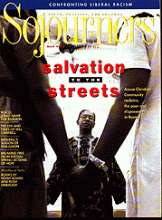The spring of 1993 lends itself, tragically, to efforts aimed at combating racism. The current retrial of four Los Angeles policemen for savaging Rodney King reminds us of the incredible verdict in their favor a year ago. This spring also marks the 25th anniversary of Martin Luther King Jr.'s assassination in Memphis.
This sad combination of events compelled Sojourners to initiate a call to action to people and communities of faith and conscience around the country. That call was quickly joined by such groups as Kairos/USA, Pax Christi USA, Bread for the World, the Racial Justice Working Group of the National Council of Churches, Evangelicals for Social Action, Clergy and Laity Concerned, the Baptist Peace Fellowship of North America, the Fellowship of Reconciliation, and Church Women United. Together we named the response being called for "Spring Actions of Hope: Breaking Free From Racism," and set apart the weekend of April 29-May 2, 1993, for these actions.
The Spring Actions of Hope have three components -- dialogue, worship, and action. Each of these components is important, and communities across the nation are urged to engage in all three. Dialogue is the only means by which white people in America can truly feel the pain that racism inflicts on people of color. Sitting down with African Americans, Latinos, Asian Americans, and Native Americans to hear how our brothers and sisters of color have been systematically excluded from the dominant society -- this is the only way the white population can come to an understanding of the depth and magnitude of racism in this country.
Worship, especially in a penitential mode, follows directly on dialogue. To know firsthand the pain that racism has caused for millions of people throughout the 500 years since Columbus' arrival, right to our own day, drives one to ask forgiveness -- from God and from oppressed sisters and brothers.
Read the Full Article

